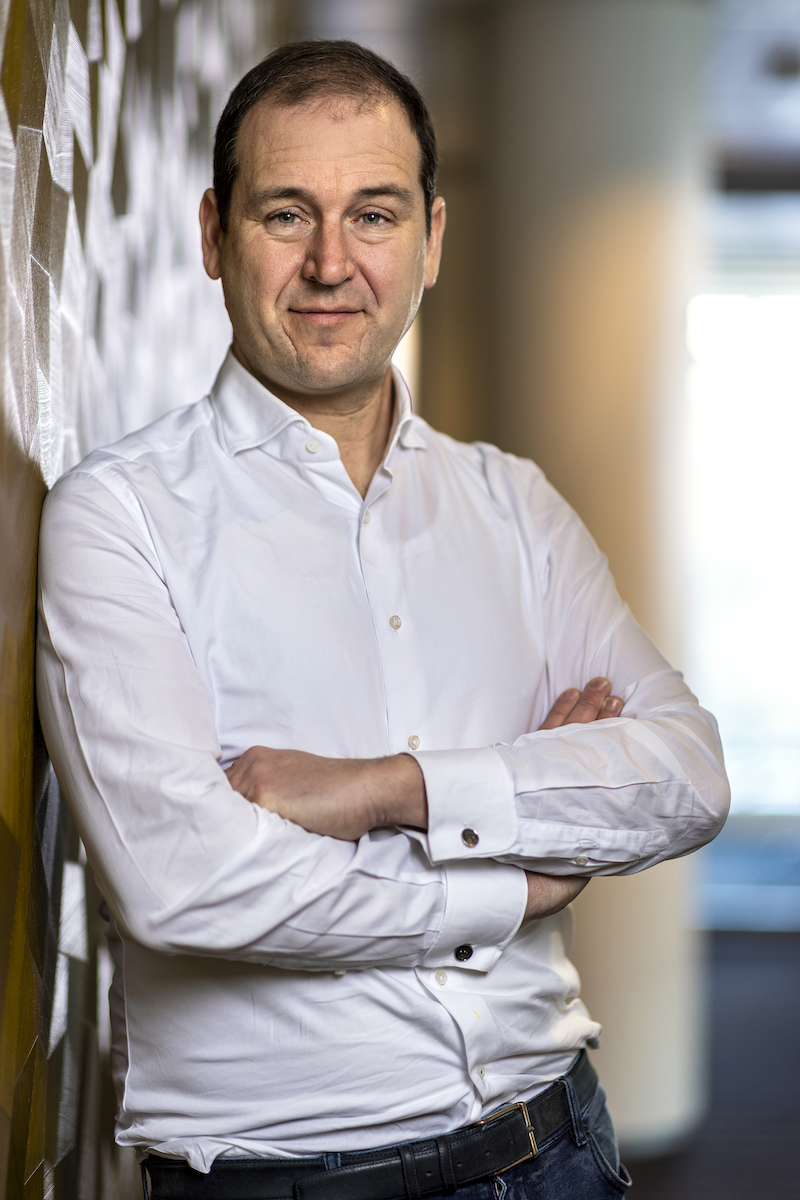Asscher: 'There is momentum, then you have to forge the iron now'
Lodewijk Asscher issued advice on how to tackle the teacher shortage, at the request of the Ministry of Education. He wants novice teachers to get a permanent contract with regional organizations. Something that raises the necessary questions in education and politics. "You can't force people, I understand that."

Picture: Fred van Diem
“It is incredibly frustrating that we are unable to find enough teachers for an entire generation of students. Students who are currently unable to use the opportunities they have. And that in such a prosperous country, absurd”, says Lodewijk Asscher.
The pain of the staff shortage in education is unevenly distributed, as a new report recently showed. The teacher shortage has risen to almost 10 thousand full-time jobs in primary education, almost ten percent of the total. There is also a great need for a large number of subjects at secondary schools. Behind these national figures lies an even more poignant reality: the shortage is much greater in the five major cities, in neighborhoods with more disadvantaged students and in special (primary) education. The helm must change, otherwise the situation will deteriorate further. Precisely for that reason, the Ministry of Education asked former politician Lodewijk Asscher to advise: what is needed to turn the tide?
AOb-chairman Tamar van Gelder will discuss his advice with Lodewijk Asscher on Thursday evening 9 March 19.30-21.00. Follow the conversation and join the chat!
Another piece of advice about the teacher shortage, sighed former Amsterdam school administrator Arnold Jonk The Parool: consultants can earn a nice living from this. Indeed, the teacher shortage is the disaster everyone saw coming for years. There are piles of reports and notes in the cupboard, including the acclaimed recommendations of 'supercharger' Merel van Vroonhoven just under three years ago. She already said it: focus on better and less voluntary cooperation in a regional context.
Competitors
That same route chooses Asscher. School boards, teacher training colleges and other parties involved must cooperate more in new educational regions. These regional organizations will become a central counter for recruitment, vacancies and training in that area. For example, Asscher wants to 'organize solidarity' in an educational system that positions school boards as each other's competitors. And striking: these education regions can offer starting teachers a permanent appointment. To do this, the law must first be amended. This 'regional appointment' must offer lecturers job security within a public organization from the start of their career. "There are still many snags", responds AObchairman Tamar van Gelder.
Can I choose which school I will work at?
Asscher: “The education region will work with you to see which school has room and which school suits you. When you are standing in front of the class, you remain in the picture: how are you doing, is it in line with your expectations? Suppose this school says after a while: Unfortunately we no longer have a place for you, then that is not your problem. You will then continue to be employed by that region and you will look at another school together. Because the risks for the school board are more limited, they will be more inclined to give you a chance.”
Most teachers feel primarily attached to a school. In the service of a region, what does that tell people?
“Well: 'I am a teacher of Amsterdam!' That sounds great."
Teacher of South Limburg?
"Beautiful."
That's very abstract, isn't it?
“Well, eventually you will teach at a school. That won't change. One will say after a year: I have found my place, I feel most at home at public primary school De Gele Reus. Another might say, I'd rather try different schools for five years. This way you can find out what suits you in a safe environment at the start of your career with a permanent appointment.”
There is a danger that some school boards will sit back and hire that young teacher less quickly. How long can they hire a teacher through the region?
“There will have to be a balance, I don't know exactly yet. The starting point is that a school board takes over a teacher after two or three years. But I don't necessarily think it's a big problem. Now a lot of money is spent on commercial employment agencies. That not only costs extra money, you also build up very little. But you are right, there must be a balance. This could also be done with financial incentives, for example, by making it more expensive for a school board to hire a teacher for longer.”
'That's life. An advice is never 100 percent literally adopted'
'The aim is that eventually everyone will start as a regional lecturer', Asschers advises. This should ensure that there are also enough teachers in the card catalog and that the regional offer really has something to do with it. But in their response, the ministers and the educational organizations are marking time: they put the teacher's own choice first and strongly emphasize the voluntary nature of such employment.
There is quite a bit of light in there…
"Certainly, that's life. An advice is never 100 percent taken literally. You can't force people to work for such a region, so I understand that. But I see the glass as more than half full. Education regions can become attractive employers if they have more scale. Look at how large companies are able to retain new employees. You offer an inspired environment, with development opportunities, security of existence... I think that's a great offer. It would be a shame if it were watered down in the effect. There is now momentum: the trade union movement, school boards, umbrella organizations and politicians all agree that something is needed. So you have to strike the iron now.”
(The article continues below the photo.)

Louis Asher. Image: Fred van Diem
Objections
The title of the advice Kids first recalls the motto with which Asscher campaigned with the PvdA in 2006 for the Amsterdam municipal elections. Not by chance. At the time, the party was strongly committed to improving weak schools, so that all students would receive a good education. The booklet The Unveiled City tells how Asscher was regularly at odds with school boards who mainly saw this as inappropriate government interference.
If you want to change things, you always run into objections. The well-known three: can't, can't, we already do
“If you want to change things, you always run into objections. The well-known three: can't, mustn't, we already do. It's a reminder: guys, it's ultimately about how we provide children in this country with a good education. And all other interests must be put aside for that. It is also a reference to the mentality and swagger that is needed to get something moving”, Asscher explains.
The advice contains a lot of official language and abbreviations such as RAP, SO&P and RATO. D66 spoke in the House of Representatives about 'policy porn'.
“I understand that, I could have made that comment myself. It doesn't read like poetry, but all those abbreviations do mean something. We really tried to look under the hood: what can you turn to change things? Then you also have to be prepared to look at the technology behind it, at the glow plugs.”
Many parties fear even more administrative pressure with these regional organisations.
“I find that criticism a bit lazy. Ultimately, it is the task of those educational regions to relieve others of their concerns, they remove risks from school boards. If you want to find and retain more teachers, you will have to train, guide and match them properly. If you organize all this in one central location in the region, you actually get less overhead.”
Would school boards be able to manage with a smaller HRM department?
"I think so."
So who can downsize their staff offices?
“Well, not right away tomorrow. But I would love it if a conversation started: what you do so well here for your school board, couldn't you do that very well for the entire region? We don't have to put new people everywhere, it's much more about bundling one task in one place. I will be the last to say: We are going to set up another meeting circuit.”
Without support nothing will happen. How do you anchor the voice of the profession?
“The ministry has to see to that. We have not made a blueprint, the regions are too different for that.
But how can the ministry assess that for all those regions at that distance?
The ministry makes performance agreements with each of those regions. As one of the components of this, it seems obvious to me that the professional group is closely involved. There will also be a program council at the ministry in which the professional organizations will participate. More control at the Ministry of Education, Culture and Science is also a wish that I hear from the trade union movement.”
An important pillar in your advice: tempting part-time teachers to work more hours. This cabinet has started a trial with a bonus. Shouldn't you first tackle the workload?
“You shouldn't look at one measure. That's the political flaw with that bonus, if I'm being honest. The danger is precisely that such a bonus distracts from the real problem: what prevents teachers from working more? That is indeed his work pressure. But also in all kinds of practical matters. This also applies to schedules, flexibility and combination of activities. There is much to be gained at this point. Because if you can entice people who already work in education to work more hours, you will have a great result.”
But that has been possible for a long time, hasn't it?
“That's right, that's been possible for a long time. It does happen in some places.”
You delivered this advice as 'quartermaster'. You were previously the 'figurehead' for education around the National Growth Fund, chairman of a task force in MBO and you have recently also become chairman of the Digitalisation Impulse Education...
“Yes, a lot of education, huh. Since I came to the city council at the age of 27, this topic has always been the most important to me. What can we do for children, how can we divide the opportunities fairly? Such an MBO assignment, for example, is called in 'policy porn' official language 'task force macro-efficiency in MBO'. But it is about something very concrete: how can you train young people as promising as possible? That's great to work on.”
Explanation: Advice in a nutshell
More and better cooperation in the region. That is an important part of the advice Kids first that consultancy Van de Bunt published at the request of the Ministry of Education about the teacher shortage. School boards and teacher training colleges will together form cross-sector (primary, secondary and senior secondary vocational education) education regions (Regions for the Labor Market of the Future of Education, or RATO), which will act as a central counter for recruitment, filling vacancies and development opportunities. Two already existing partnerships, RAP (for tackling staff shortages) and SO&P (for training and professionalisation), will be combined in this. A striking element is that starting teachers can get a permanent appointment in these new educational regions. In time, a school board would then take over these teachers. In order to manage the education regions, the Ministry will set up a so-called Realization Unit, an organization that will provide national coordination and direction. According to the advice, the regions will manage a personnel budget of about 50 to 200 million euros, plus 20 to 80 million euros that is needed for recruitment, matching, guidance and the internal organization. All this, the intention is, should result in a regional, public place where teachers are offered social security and perspective.
Also read the reaction of AOb-chairman Tamar van Gelder: "There are still a lot of snags."


